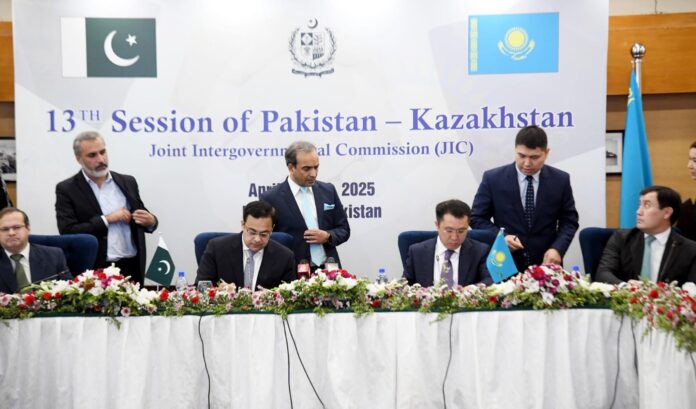Pakistan and Kazakhstan have agreed to sign a transit trade agreement for the movement of goods through key Pakistani ports—Karachi, Bin Qasim, and Gwadar—further expanding trade corridors with other regional landlocked nations.
This decision was reached after the 13th session of the Pakistan-Kazakhstan Joint Intergovernmental Commission (IGC), which took place on Tuesday.
The two-day conference, co-chaired by Pakistan’s Federal Minister for Economic Affairs Ahad Cheema and Kazakhstan’s Transport Minister Marat Karabayev, focused on trade, economic, scientific, and cultural cooperation.
The meeting resulted in the signing of seven memoranda of understanding (MOUs) covering multiple sectors, including transport, trade, education, business, and culture.
A key agreement was made on finalising the Transit Trade Agreement, which will allow Kazakhstan to utilise Pakistan’s ports for trade.
Both nations are also considering the launch of direct flights to improve connectivity to strengthen trade and regional ties. During a meeting in Islamabad, Kazakhstan’s Transport Minister Marat Karabayev and Pakistan’s Communications Minister Abdul Aleem Khan discussed easing travel restrictions and improving transport links between the two countries.
Khan suggested launching direct flights from Lahore, Islamabad, and Karachi to Kazakhstan, while advocating for better visa facilitation for Pakistani business travelers. He also highlighted Pakistan’s efforts to upgrade road and rail infrastructure to enhance trade with Central Asia and reinforce trade corridors through Afghanistan.
Additionally, both countries agreed to begin implementing the ‘Roadmap for Trade and Economic Cooperation.’ The agreement aims to enhance regional connectivity through the Kazakhstan-Turkmenistan-Afghanistan-Pakistan and Kazakhstan-Uzbekistan-Afghanistan-Pakistan trade routes. The success of a multimodal trade corridor from Jebel Ali in the UAE to Almaty, Kazakhstan, passing through Pakistan, was also celebrated.
Further collaboration is expected between logistics companies from both countries, with the goal of facilitating cross-border movement of goods through Pakistan’s ports.
In agriculture, Pakistan and Kazakhstan agreed to launch the first meeting of their Joint Working Group to explore investment opportunities and strengthen cooperation on plant protection and quarantine standards.
Progress was also made in the financial sector, with the two countries moving towards an agreement between Pakistan’s State Bank and Kazakhstan’s regulatory agency. Pakistan also committed to providing capacity-building support to Kazakhstan through training programs for banking professionals.
In terms of tourism and cultural exchange, the two nations agreed to promote joint tourism initiatives and share lists of certified tour operators. Kazakhstan expressed interest in opening branches of the Chess Academy and Qazaq Batyry Mixed Martial Arts Academy in Islamabad.
Additionally, both countries agreed to name streets in Islamabad and Astana after prominent figures, Muhammad Ali Jinnah and Abai Qunanbaiuly, as part of their cultural cooperation.
The two sides also discussed strengthening educational ties, agreeing to set up a joint working group to enhance academic collaboration, and considering the establishment of a science and technology center at NUST, Islamabad.
Several MoUs were signed between Pakistan’s NADRA and Kazakhstan’s National Information Technologies Agency, and between Astana Hub and Ignite, paving the way for future cooperation in digital innovation and governance.
Earlie, on Monday, as part of the broader bilateral relations, Pakistan and Kazakhstan also signed business agreements valued at an estimated $140.8 million during a business forum and B2B meetings in Karachi. Over 300 participants, including 100 Kazakh government officials and business leaders, engaged in discussions aimed at fostering trade partnerships.
Key deals included an agreement for the supply of anhydrous milk fat from Friesland Campina Engro Pakistan Limited to Optima Development Kazakhstan and another MoU involving cooperation between the Governor’s Office of Kyzylorda Region and businesses in Pakistan and Kazakhstan.
Officials called the forum a major step in strengthening economic ties, with further initiatives planned to enhance trade and collaboration between the two countries.




